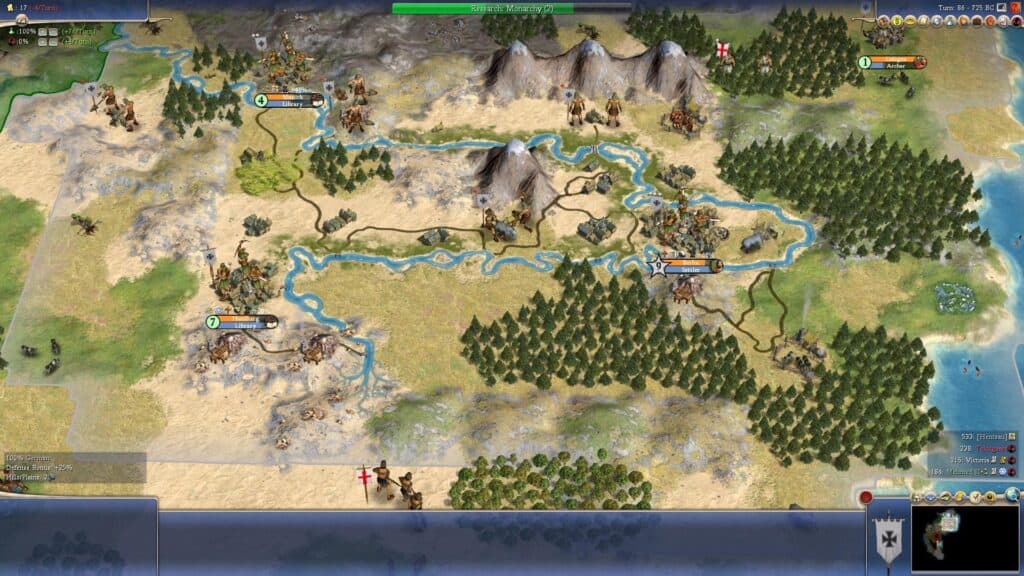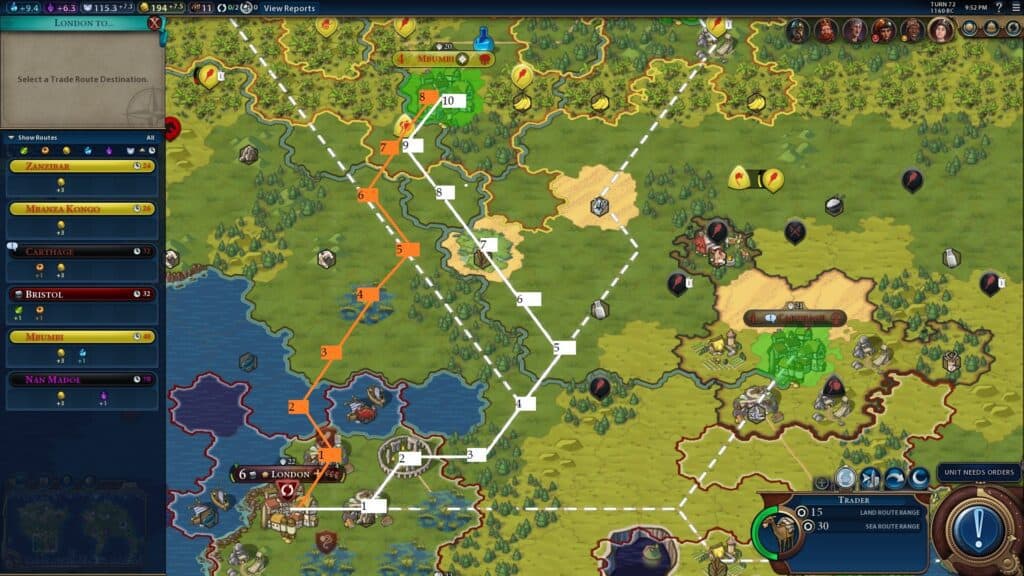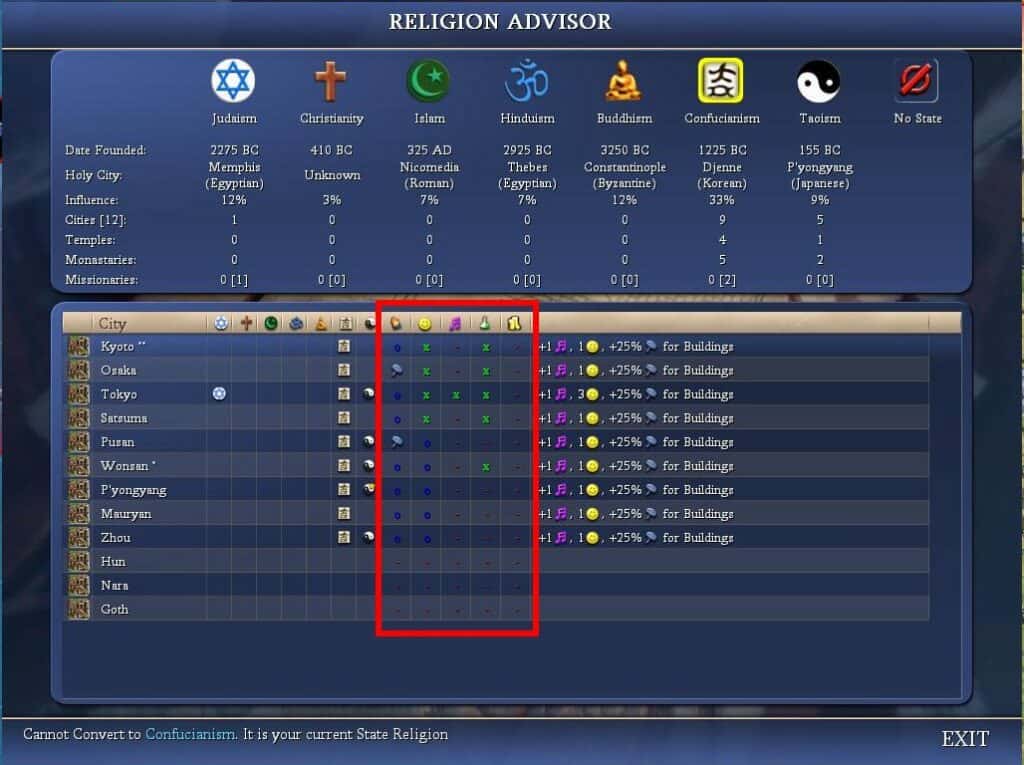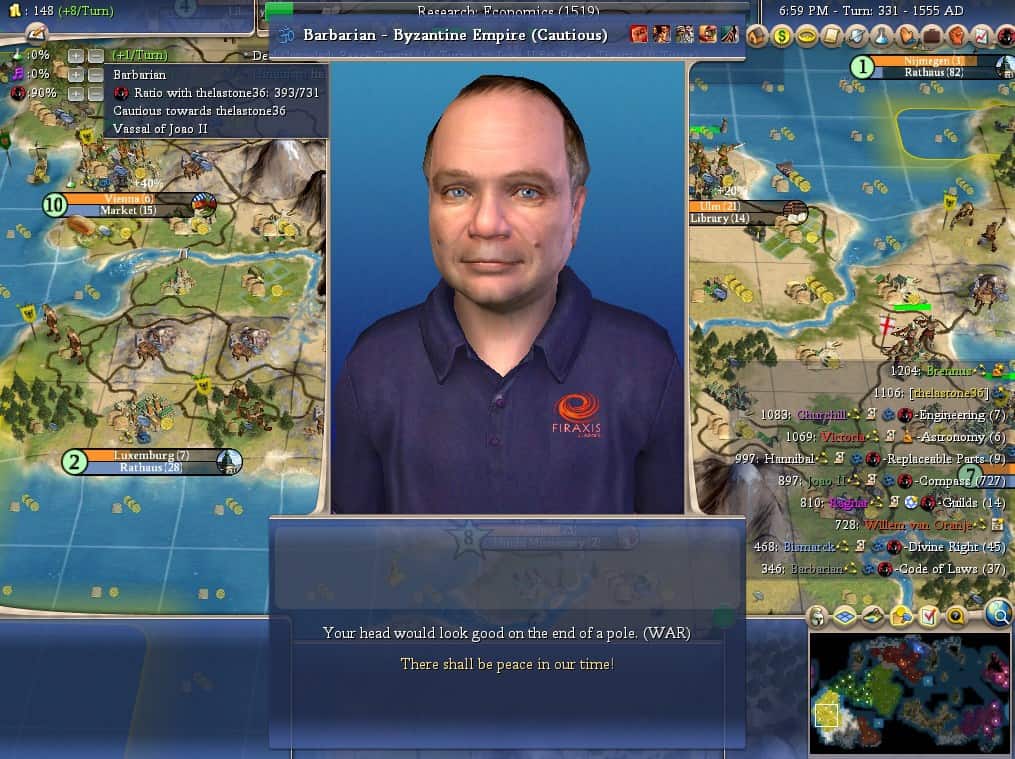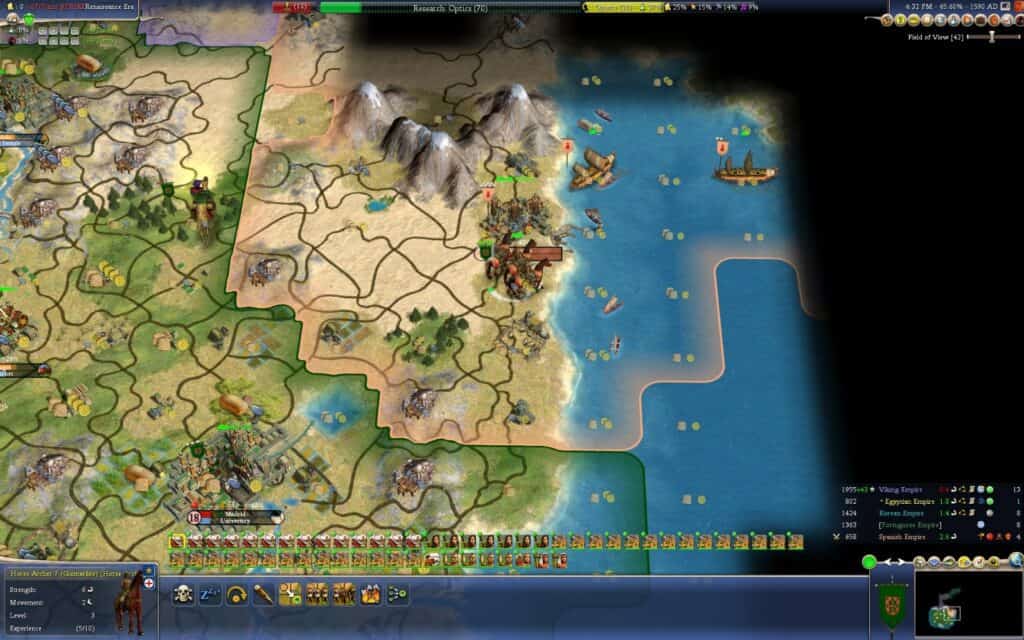Sid Meier’s Civilization IV (Civ4 or Civilization IV) is the 4th installment of the long-running turn-based real-time strategy (RTS) Civilization computer game released back in 1991. Civ4, which was released in 2005 under the direction of Sid Meier and Firaxis Games, revolutionized the franchise.
It perfected many aspects of the series, and this was apparent from the word go. Starting from the Grammy Winning “Bata Yetu” theme song (the first videogame song to ever win a Grammy) to the incredible narration by Sid Meier himself, players knew they were in for a treat.
The living 3D world of Civilization IV comes to life in its graphics and helps to elevate the franchise to new levels. It’s herald as one of the top 10 games of 2005 and often declared one of the best strategy games of all time. Civilization IV is a must-play for gamers.
Up until 2010, Civilization IV would be the latest installment of the franchise. It was released between October 25th-November 4, 2005, in Europe, Australia, and North America. Civ4 had two expansions: Warlords, released on July 24th, 2006, and Beyond the Sword, on July 23rd, 2007.
Overview of Civilization IV
Civilization IV is an RTS in which players build an empire from scratch. All standard, non-modded, full-length games start in 4000 BC (the Ancient Era) with one Settler who can build the empire’s first Scout or Warrior. The player expands their empire by utilizing their terrain to earn resources, speaking and fighting with rivals, and developing different technology.
Diplomacy is a major obstacle the player faces, as they need to stay in good standing with AI Leaders who may destroy or help them. Players must also decide where to build, how to progress, where to explore, and how to maintain resources.
Unless the player is defeated early on, the game ranges from the start of The Ancient Era until 2050 AD. Players will advance their technology slowly based on their own production on research and which Great People they pick up along the way. The Technology Tree contains most of the buffs a player will receive, like gunpowder, paper, and nuclear fusion.
Culture and religion are integral to how a civilization expands, as they are needed to speak to Leaders, infiltrate other societies, and cause a rebellion. Players must build World Wonders to expand their cultural significance and spread religions by building temples and churches.
To win, players must either conquer all civilizations, dominate the map, complete the space race, create a legendary culture, or earn the diplomatic vote from the United Nations. The game’s clock may also run out, in which the game will declare a winner based on score.
Gameplay
The following includes all of the most important aspects of gameplay found in Civilization IV.
Diplomacy
The Diplomacy system in Civ4 is a system of positive and negative factors that influence how an AI Leader feels towards the player. Every diplomatic action has a reaction, and these points are accumulated throughout your time spent trading with the leader. Fostering a positive relationship with an AI Leader is very important as these Leaders are associated with other Leaders.
All AI Leaders influence your fate, one way or another, and some Leaders are easier to impress than others. For example, Montezuma is unpredictable and may war with you for no reason, while Gandhi is easygoing and typically wants to cooperate with you. Both leaders want different things and have separate requirements for whether or not they’ll help or fight you.
In Civilization 4, Leaders are more forthcoming with how they feel about the Player characters. They will display their attitudes (furious, annoyed, etc.) and why they are angry with you. Happy Leaders will accept deals without bargaining, but unhappy leaders may attack your units.
Players may trade resources (food, wine), technologies, gold, and maps (to reveal more information about the world). While conducting advanced diplomacy, you can promise military aid, create trade embargoes, or adopt certain religions or civics at the behest of a Leader.
Players can create the United Nations, a wonder which makes it possible to conduct resolutions to widespread problems and the option for diplomatic victory. These actions are binding.
AI Leaders and Civilizations
There are 18 civilizations in Civ4, 8 of which have 2 leaders. Each leader offers unique Traits, which can help your strategy, max gold trade percentage, and more. For example, George Washington gives +2 health per city, 25% faster production speed for workers, and double production speed for Harbor and Granary. There are several other buffs this leader can give.
Each leader offers a unique unit, which replaces an older unit in your roster. For example, a Camel Archer, given by the Arabian civilization, replaced the Knight. All Leaders are based on their real-life counterparts and exhibit similar personality traits, politics, and military units.
| Civilization | S. Advance | Units | Leaders | Traits | F. Civic | Capital |
| American | Agriculture, Fishing | Navy SEAL | George Washington, | Organized, Financial | Universal Suffrage | Washington |
| Franklin D. Roosevelt | Organized, Industrious | |||||
| Arabian | The Wheel, Mysticism | Camel Archer | Saladin | Spiritual, Philosophical | Theocracy | Mecca |
| Aztec | Hunting, Mysticism | Jaguar Warrior | Montezuma II | Spiritual, Aggressive | Police State | Tenochtitlan |
| Chinese | Mining, Agriculture | Cho-Ko-Nu | Mao Zedong | Organized, Philosophical | State Property | Beijing |
| Qin Shi Huang | Financial, Industrious | Bureaucracy | ||||
| Egyptian | The Wheel, Agriculture | War Chariot | Hatshepsut | Creative, Spiritual | Hereditary Rule | Thebes |
| English | Mining, Fishing | Redcoat | Victoria | Financial, Expansive | Representation | London |
| Elizabeth I | Financial, Philosophical | Free Religion | ||||
| French | The Wheel, Agriculture | Musketeer | Louis XIV | Industrious, Creative | Hereditary Rule | Paris |
| Napoleon Bonaparte | Industrious, Aggressive | Representation | ||||
| German | Hunting, Mining | Panzer | Fredrick II the Great | Philosophical, Creative | Universal Suffrage | Berlin |
| Otto von Bismarck | Industrious, Expansive | Representation | ||||
| Greek | Hunting, Fishing | Phalanx | Alexander III the Great | Philosophical, Aggressive | Vassalage | Athens |
| Incan | Mysticism, Agriculture | Quechua Warrior | Huayna Capac | Industrious, Financial | Hereditary Rule | Cuzco |
| Indian | Mining, Mysticism | Fast Worker | Mohandas Gandhi | Spiritual, Industrious | Universal Suffrage | Delhi |
| Asoka | Spiritual, Organized | Free Religion | ||||
| Japanese | The Wheel, Fishing | Samurai | Tokugawa Leyasu | Organized, Aggressive | Mercantilism | Kyoto |
| Malinese | The Wheel, Mining | Skirmisher | Mansa Musa | Spiritual, Financial | Free Market | Timbuktu |
| Mongolian | The Wheel, Hunting | Keshik | Genghis Khan | Expansive, Aggressive | Police State | Karakorum |
| Kublai Khan | Creative, Aggressive | Bureaucracy | ||||
| Persian | Hunting, Agriculture | Immortal | Cyrus the Great | Creative, Expansive | Representation | Persepolis |
| Roman | Mining, Fishing | Praetorian | Julius Caesar | Expansive, Organized | Representation | Rome |
| Russian | Mining, Hunting | Cossack | Catherine II the Great | Financial, Creative | Hereditary Rule | Moscow |
| Peter I the Great | Philosophical, Expansive | Bureaucracy | ||||
| Spanish | Mysticism, Fishing | Conquistador | Isabella I | Spiritual, Expansive | Theocracy | Madrid |
Although you can make friends with all AI Leaders, you will eventually have to choose between one or the other. Leaders won’t like you speaking or trading with their enemies, and it will cause both Leaders to lose respect for you. Players can also make enemies hate each other, accept bribes, and ask them to secure flanks or rear borders when an attack occurs from an enemy.
Leaders are generally predictable, except Montezuma, and won’t attack you as long as you remain friends. However, if you are frequently attacked and have a small army, AIs may attack you or your neighbors at any point. The AI will backstab you to win a war.
Resources and Trade
Resource management and trade encompass a large portion of Civ4, as you need resources to create wonders, buildings, units and expand your technology. Specific resources have features that aren’t found elsewhere. For example, stone and marble can double the production speed of buildings and wonders. Others provide happiness or health to cities (incense, dye).
World Wonders can produce cultural goods instead of resources, like Hit Musicals and Hit Singles, which are useful in trade with Leaders. To trade other goods with other civilizations, they have to need or want to resource. To start a trading route, you need to connect borders by ocean tiles, rivers, or roads. Cities on the same river have an automatic connection in trade.
Combat
Combat works differently in Civilization 4, as units don’t have separate attack and defense values anymore. Instead, each unit has a base strength that may increase or decrease based on multiple scenarios, and that strength stat affects the amount of damage a unit does.
The 1.52 patch uses the unit’s base strength, but before the patch, the damage was calculated based on the unit’s current strength. Units no longer use a generic ranking system to level up but gain combat experience and bonuses based on their abilities and what enemies they defeat.
There are 41 combat promotions. Each bonus stacks on top of each other based on the category, which is separated between the Specialization, Universal and Supporting ranks.
Before a player attacks another unit, they can view the “combat odds” pop-up, which explains how likely each unit will succeed based on various bonuses, such as army advancement, economy, production output, and scientific advancements.
The 1.61 patch expands on combat by averaging a damaged unit’s attack and damage stats based on how damaged they are. Further damage makes the unit weaker.
Civic Model
Players can build their political systems from five pieces: Economy, Government, Labor, Legal, and Religion. In each category, there are five possible choices, making 25 different civic models possible. Below is a charge that examines their requirements, upkeep, and strengths.
| Civic Model | Categories | Required Tech | Upkeep | Buff |
| Economy | Decentralization | None | Low | Default |
| Mercantilism | Banking (700 Science) | Medium | +1 free specialist in all cities, no foreign trade routes available. | |
| Free Market | Economics | Low | + 1 trade route in all cities -25% maintenance costs from corporations. | |
| State Property | Communism | None | No maintenance cost from distance to palace, +1 Food from watermill/workshop, +10% Production all cities, all corporations have no effect. | |
| Environmentalism | Ecology | High | + 6 health all cities, +1 happiness per forest/jungle in reach, +2 Public Transportation, +2 Gold from Windmills and Forest Preserves, +25% maintenance costs from corporations. | |
| Government | Despotism | None | Low | Default |
| Hereditary Rule | Monarchy | Medium | +1 happiness in the city per military unit positioned in the city. | |
| Representation | Constitution | Low | +3 happiness in 4 biggest cities, +3 research per every specialist per city. | |
| Police State | Fascism | High | War wariness – 50%, military units produce +25% more. | |
| Universal Suffrage | Democracy | Medium | Spend Gold to quicken production, +1 production from towns. | |
| Labor | Tribalism | None | Low | Default |
| Slavery | Bronze Working | Low | Hurry Productions, which scarifies city population. | |
| Serfdom | Feudalism | Low | Workers build Improvements 50% quicker. | |
| Caste System | Code of Laws | Medium | Unlimited number of scientists/merchants/artists. | |
| Emancipation | Democracy | None | Doubles speed of Village, Hamlets, and Cottage growth, negative influence of total happiness without emancipation. | |
| Legal | Barbarism | None | Low | Default |
| Vassalage | Feudalism | High | Additional free units, +2 xp for every new military unit. | |
| Bureaucracy | Civil Service | Medium | +50 Production in capital, +50% income. | |
| Nationhood | Nationalism | Low | Can draft citizens +2 happiness in cities with barracks. | |
| Free Speech | Liberalism | None | +100% culture, +2 commerce in each town. | |
| Religion | Paganism | None | Low | Default |
| Organized Religion | Monotheism | High | Can build a missionary without monasteries, +25% building Production. | |
| Theocracy | Theology | Medium | No no-state religion spread, +2 xp for every military unit built. | |
| Pacifism | Philosophy | None | +100% GP points in all cities, +1 Gold cost per military unit. | |
| Free Religion | Liberalism | Low | +1 happiness per every religion in the city, +10% research entire empire, no state religion. |
To gain technology, you have to conduct research through technology or religion.
Religions
In previous games, Religion was an add-on feature that produced health and happiness for a population and allowed players to build cathedrals and temples. However, in Civ4, Religion is tied to technological advancements and offers unique units (Taoism, Islam, Confucianism, Christianity). Temples or cathedrals are unique to each Religion and produce different resources.
There are 7 different religions in the game; each one is achieved through technology.
- Buddhism: Meditation Tech
- Hinduism: Polytheism Tech
- Judaism: Monotheism Tech
- Christianity: Theology Tech
- Taoism: Philosophy Tech
- Islam: Divine Rights Tech
Buddhism, Hinduism, and Judaism can be found quickly, but Christianity, Confucianism, and Taoism take some time to get off the ground. You can quicken the process by using The Oracle Wonder tech. Islam is discovered last, you can also find a religion yourself, but it takes time.
Civilizations that share common religions will be more friendly towards you, and civilizations that don’t share religions will be hostile towards each other. The first civilization to discover a religion will receive that religion’s most sacred building, which offers a +1 gold per city tithe from each city. They’ll also receive a Great Profit and the potential to grow a holy city.
Nations that have a state religion, the religion’s sacred building, and are established as a holy city are able to see all cities that are under the same religious umbrella.
Technology (Units, Wonders, Buildings)
Before Civilization 4, there were technologies civilizations could discover. In Civ4 specifically, there are 85 techs in the game, and they have many uses. It’s impossible to win without tech.
Technology can be used to construct new buildings/wonders, trade, founding new religions, and develop new Governments. To get new technology, you first need to discover previous techs. For example, Banking needs to be discovered in the Medieval era to gain Mercantilism.
To access the Tech Tree, press F6 on your keyboard. You’ll see a flexible development tree that shows different ways to reach a similar conclusion, and all techs, even unavailable or far-reaching technology, can be selected for research. Civilization will pick the shortest path to the next tech path regardless of how many adjacent techs you’ve searched in the past.
The entire Tech Tree leads to two final techs: Future Tech and Fusion, which requires 8000 science research. Choose the Printing Press for Fusion or Education for Future Tech. Future Tech doesn’t add to your final score but instead dives a +1 health and happiness bonus to each Future Tech. You can gain an infinite amount of both Technologies until the game ends.
Players can also construct wonders and buildings with culture, production, gold, and Technology. Whereas most buildings can be made multiple times, each wonder can only be made once. Units also need resources, but the amount of units that can be made is dictated by how large your city is, how many resources you have (specifical food), and resource limit.
Great People
Great People in Civilization IV are separated into five categories: artists, engineers, merchants, prophets, and scientists. Each of these categories grants bonus abilities and buffs. Players can gain Great People by completing specific requirements, like earning technology.
- Great Artists – Great Work/Culture Bomb: Instantly makes 4000 culture points, immediately stops a riot, and adds a +60% defense bonus to cities: +12 culture, +3 Gold.
- Great Engineers – Hurry: Immediately gives 1000 Production to any building, making it possible to finish buildings and Wonders in one turn: +3 Research, +3 Production.
- Great Merchants – Trade Missions: Earns more money per trade mission, which varies from 700-3500 or more. They make great spies. +1 Food, +6 Gold.
- Great Prophet – Build the Shrine: Shrines help spread religions and give +1 Gold for every city where believers are present. +5 Gold and +2 Production.
- Great Scientists – Build Academy: Academies give the city a +50% research bonus, which can help you generate research for technology. +6 research, +1 production.
Every Great Person can be used to research technology or trigger the Golden Age, which significantly boosts your Commerce and Production output.
New, Included, and Reworked Features
Features Included in Civilization IV
On the official Civilization website, you can still find its “Features” page, which examined the many included features in the 4th installment made to the franchise. They state the following:
- Faster-Paced Fun: Gameplay is streamlined for a more compelling experience.
- Easier to Play and Access: Uses an interface that’s more in line with modern RTS’s.
- Tech Tree: This contains a Flexible Tech tree, so players can make more strategic choices.
- Improvements: More units, Civilizations, and improvements that enhance gameplay.
- Multiplayer: Has connectivity to the Internet for competitive and cooperative play.
- Team Play: Cooperative play gives players new ways to play the game
- Graphics: Utilizes 3D graphics, fully animated units, and customizable armies.
- Mods and Tools: Completely moddable with Python or XML.
- Choose Your Leader: Players can choose from 2 leaders, all with unique traits.
- Civics: When new tech is discovered, civic options become available.
- Religion: Choose from 7 different religions unlocked through researching.
- Great People Points: Use specialists to gain points to get various buffs.
- Promotions: All units have a promotion path that changes stats.
- In-Game Movies: Civilization 4 contains over 70 in-game movies.
Although these features are included with the game, it doesn’t state what is new and what isn’t. Great People, for example, isn’t a new feature but was tweaked to work within Civ4.
New Gameplay Features
The following gameplay features are new to Civilization IV. Some of the features included in this list may have appeared in spinoffs, like Colonization, but are new to the main franchise.
- The Religion feature is no longer generic and is now a main aspect of the game. The spread and adoption of state religion works differently from other installments.
- Great People now fall into five separate categories: artists, engineers, merchants, prophets, and scientists. Each of these categories grants bonus abilities and buffs.
- Previous installments would subtract from a city’s population once completed, but Settler and Worker units now need the city to halt population growth. This makes it difficult to build in smaller cities, but encourages players to build up cities prior to expanding.
- Corruption was completely removed from Civ4 and replaced with city maintenance. Civilizations with many ineffective or small towns/cities will be expensive to maintain.
- Members of one civilization can’t cross another unless they both agreed to an open borders treaty or they’re currently at war. Special units, like spies, can cross regardless.
- The new civic model replaces the Government model from past installments. Civics allows the player to set the amount of freedom for its citizens. Civic models are based on five categories: Economy, Government, Labor, Legal, and Religion.
- Units in Civilization 4 don’t walk around with the assumption that they’re aware of the entire map. They will fill in their mapping knowledge as they wander through the world.
- AI is more intelligent than it was in the past. You’re able to use more intricate gameplay options, like future planning, which helps players create better strategies.
- Barbarians are capable of forming cities and are named after a tribe or culture. Barbarian cities act similarly to others, but they cant be contacted with diplomacy.
New Interface Features
The interface of Civilization 4 received a makeover and resembled more modern RTS’s of its time. The new interface made it easier for new players to understand Civ and master it.
- The City Health system combined pollution and other aspects. Improvements and resources add health points, and industry and population growth decrease them. Any negative total of resources puts penalties on the city, including nuclear fallout.
- Cities can’t fall into disorder, but the population won’t work without enough happiness.
- Many streamlining elements were added, like being able to issue multiple orders.
- Discovered technology or other resources isn’t wasted after a population grows.
- All map-view mode functions are located in the standard map view. Players no longer have to access the City Management or Advisor screens to look at their abilities.
New Audio-Visual Features
- The soundtrack of Civilization 4 features a variety of historical and original music. The rest of the audio and visual aspects were improved significantly, like voice acting. “Baba Yetu,” the game’s main theme, won a Grammy for Best Instrumental Arrangement Accompanying Vocalists.
- Increased importance was placed on the soundtrack, which includes historical music relevant to particular time periods present in-game. Most pieces were composed by Jeff Briggs, except for the main theme, Babe Yeti, which was written by Christopher Tin.
- Each leader has a unique piece of music that plays during diplomacy, except for Genghis Khan and Kublai Khan, which both use the same music.
- Land-based units offer short quotations when picked in their native language. They will continue to hear sounds from their population if they zoom closer to the city.
- Sound effects are played when buildings are clicked when the terrain is zoomed into (water crashing), and when an improvement is made, or a building is completed.
- Civilization 4 contains over 70 in-game movies or “Wonder Movies.”
- Civ4’s 3D Engine allows players to zoom in about out smoothly from the world map.
There are over 20 improvements in the game that change the way Civ is played or makes the gameplay smoother. Most of these new features were included or improved upon in Civ5.
Scenarios, Maps, and Bonus Content
Civilization 4 included a bunch of bonus features, content, scenarios, and maps that players could experience. The following was added to show off how the game could be modded.
- Earth: Based on Robinson’s Projection of the Earth, it contains 9-18 civilizations. The Earth 18-civilization scenario won 1st place at the GameFlood modding contest.
- Earth Ice Age: A map that is set during the ice age. Includes 11 civilizations.
- Earth 1000 AD: Recreates the Crusades. Includes 13 civilizations.
- Greek World: A scenario with a map that resembled Hecataeus’s World Map, which was created by the ancient Greeks, To reenact classical Mediterranean battles.
- Desert War: Take control of the Axis and Allies, who have different objectives, at the Mediterranean theater of World War II. Hold out for 10 turns to win this scenario.
- American Revolution: Choose between the British Crown or American Colonists.
- Africa: Travel to the African continent and battle 9 randomly selected nations.
These maps were released with the base game, except for Africa, which was added in v1.74.
Customization and Modding
Civilization 4 opened the door for more unique maps and scenarios due to its vast customization features. Game data and rules are stored in XML files, and coding is written entirely in Python. A Software Development Kit, released in April 2006, allowed more advanced AI customization.
Frequently Asked Questions (FAQ)
Answer: Civilization 4 is still one of the best renditions of the franchise despite it being over a decade old. The core gameplay in Civ4 is so tight and perfectly executed that it will likely play well for years to come. There are plenty of websites and fan forums that are creating new strategies to this day, and the gameplay is constantly evolving as new players join the game.
Answer: Civilization 4 lost online functionality before it was available to purchase online. Since it’s released on Steam, players can enjoy battling other civilizations with their friends in a cooperative or competitive environment. If you currently have an old copy of Civilization 4, it’s in your best interest to download Civ4 on Steam to gain access to mods and updates.
Answer: You can start the game by running the tutorial, and you don’t have to start a new game to do it. Civilization 4 will automatically begin as Warlords if you’re using the Gold edition, so you need to Launch the Civilization4.exe file instead of Gold (which is downloaded from Steam). Launching that file will allow you to select the tutorial from the main menu.
Conclusion
Civilization IV is one of the best Civ games in the franchise and deserves a second look if you’re recently getting into RTS’s. While the gameplay and features may feel a little outdated for some players, it’s worth the learning curve. After successfully getting through the tutorial, you’ll start creating civilizations, discussing diplomatic relations with leaders, and winning games quickly.
Have fun developing vast civilizations in the 4th edition of the Civilization franchise!


